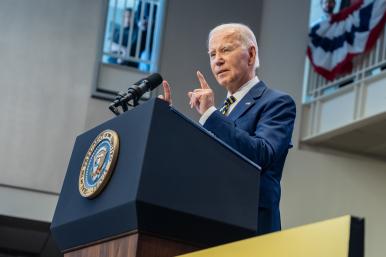
Never miss a breaking event on U.S. policy interests in the Middle East. Customize your subscription to our expert analysis, op-eds, live events, and special reports.
Iran’s decision to launch a direct, state-on-state attack against Israel on April 13 increased the risk of overt conventional conflict in the Middle East. This attack was significant in scope, scale, and complexity, employing hundreds of one-way attack drones, cruise missiles, and ballistic missiles. Equally significant was the U.S.-organized effort to defeat Iran’s attack, working with Israel as well as European and Arab allies to integrate capabilities and defend the region’s airspace. Although not publicly claimed, the April 19 Israeli response targeted air defenses protecting Iran’s nuclear program deep inside the country, without damage to civilian infrastructure or civilian casualties. And while the April 2024 escalation cycle appears closed, the region has now crossed the threshold for state-on-state attacks, with Israel and Iran both displaying potent capabilities and resolve.